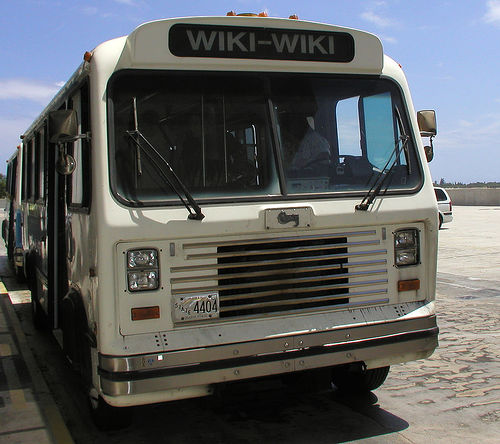 So why should you jump on this bus to wiki?
So why should you jump on this bus to wiki?A wiki is a website that may be easily and quickly developed by a community using only the Web browser on their computer. Wikis are easy to use by groups with common interests or communities of practice. Let's say that your group has an idea of a website that it would like to create. You've heard about wikis, but you and your group are definitely not a group of techies and geeks. You're looking for an easy, quick, and cost-effective solution to get your content on the wonderful world wide Web.
Here are some reasons why you may want to use a wiki:
- Wikis provide a virtual presence. Wikis allow communities to quickly and to easily create develop a Web presence, allowing community members to easily access and update content from virtually anywhere and at anytime.
- Wikis support a variety of interactions within a community. Wikis support site creators, administrators, authors, and readers; online discussions; and the collaborative development and management of web-based content.
- Wikis are generally very easy to use. It's usually very simple to post comments or questions about the content. It's usually easy to edit the content or add new pages to a website created using wiki technology. Wikis are great solutions for individuals and groups with little or no technical skills.
- Valuable content can be created using a wiki. Content which previously has not been available in a central location to the community members or other interested individuals can be included on a wiki. For example, some documents may be available in shared databases; however, those database or groupware systems are often very expensive and may not contain the most recent version. Also, many documents are sitting on the hard disks of the community members and are frequently sent across the network through e-mail systems. Again, who has the most recent version and what changes have been integrated since you last saw the document? Wikis solve most of these content management problems.
- Connections can be made to a broader subject field. You can easily include links (often called hyperlinks) to other websites within your subject field or to sites in related fields using most wiki applications
- Wikis support personal and community identities and interactions. Most wikis allow the community members to create a profile about themselves. The communities supporting the wiki are generally clearly defined on most wikis. In addition to users easily adding wiki content and making changes to existing content, messaging is often supported among members on wikis.
- Wikis support democratic participation. Wiki content changes do not require review and voting by community members. However, wikis provide an opportunity for anyone to contribute to the content. No longer is content developed and managed by a single person when using a wiki -- no more delay between submitting feedback or comments and the changes to the website content. Generally anyone can edit and create content on a wiki, but often community membership is required to circumvent spam and vandalism. There's generally not a lot of focus on the individual authors of the content -- developing the content is generally a group effort, although you can usually view the history of the revisions to content on a wiki page. However, some wikis provide a feature that allows participants to notate their updates (e.g., to automatically add the user name and time of update), which is particularly helpful in discussion threads, brainstorming sessions, and group voting, where implemented.
- Wikis enable evolution over time. Content on a wiki can be refined over time by the community participants, evolving based on community contributions and online discussions. Wiki content is generally always under construction. It's generally easy to view the prior versions of a wiki page, reviewing the changes previously made and reverting content as needed.
Today I hope that you have identified at least one great reason to give wiki a try. It's easy. It's fun. It's totally free on many wiki hosting services. The question today should not be why wiki? but instead be why not wiki? For more information, stay tuned on this blog or join me and the Everything Wiki community.
The Fine Print: Some functions may be limited on wikis by the wiki organizer in order to prevent spam and vandalism
Image credit: photo by cogdogblog from flickr





No comments:
Post a Comment